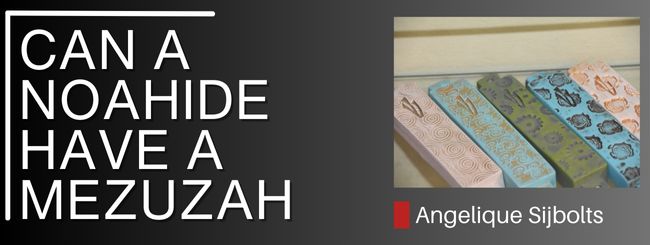בס”ד
A Mezuzah (Hebrew: מזוזה, sometimes spelled mezuzah, lit. “doorpost”) is a small parchment scroll upon which a scribe handwrites the Hebrew words of the Shema. Mezuzah scrolls are rolled up and affixed to the doorposts of Jewish homes, designating the home as Jewish and reminding those who live there of their connection to G‑d and their heritage[1].
The word “mezuzah” appears for the first time in the Bible in the account of the Exodus from Egypt. Before the last plague smiting the Egyptian firstborn, the Almighty forewarned the Jewish people to mark their doorposts with the blood of the sacrificial lamb so that the forces of destruction would pass over their houses. The Torah says:
And they shall take of the blood and they shall put it on the two mezuzoth (doorposts) and on the lintel… For the L-rd will pass through to smite the Egyptians, and when He seeth the blood upon the lintel, and on the two doorposts, the L-rd will pass over the door, and He will not allow the destroyer to come in unto your houses to smite [you]. (Exodus 12:7, 23)[2]
Recall that it was no small task to smear the blood of a lamb on the doorpost. The lamb was a god in Egypt, so killing a lamb and smearing its blood on the doorpost was a public sign of contempt for the god chnum of Egypt[3] and openly acknowledging the One and Only G-d and the trust one placed in Him. Because of this, the mezuzah is also a reminder of the miracle of salvation that took place in Egypt.
The specific Jewish commandment is to always – so after the exodus from Egypt, place a mezuzah on the doorpost we see in the following text.
וּכְתַבְתָּ֛ם עַל־מְזוּז֥וֹת בֵּיתֶ֖ךָ וּבִשְׁעָרֶֽיךָ׃
and inscribe them on the doorposts of your house and on your gates—
לְמַ֨עַן יִרְבּ֤וּ יְמֵיכֶם֙ וִימֵ֣י בְנֵיכֶ֔ם עַ֚ל הָֽאֲדָמָ֔ה אֲשֶׁ֨ר נִשְׁבַּ֧ע ד’ לַאֲבֹתֵיכֶ֖ם לָתֵ֣ת לָהֶ֑ם כִּימֵ֥י הַשָּׁמַ֖יִם עַל־הָאָֽרֶץ׃
to the end that you and your children may endure, in the land that G-d Hashem swore to your fathers to assign to them, as long as there is a heaven over the earth. (Deuteronomy 11:20-21)
It can be reasoned from these texts that it does not make sense for a non-Jew to put a mezuzah on his door:
- He was not given that command in Egypt.
- He was not liberated from Egypt and the mezuzah has no memory value.
- Nor was he later commanded by G-d to attach a mezuzah to his door.
- It is a sign of a Jewish house, and thus confusing for people to see a Jewish sign on a non-Jewish house.
- It is associated with possession of the land of Israel, which is not for non-Jews.
So, there is no reason for a non-Jew to attach a mezuzah, however, there is a good reason for not to do it. Namely, the prohibition on creating a new religion – Chiddushei Dat in Hebrew. This prohibition means that a non-Jew may not perform Jewish Commandments that are not commanded by logic or have a social benefit. This includes, for example, the commandments to observe Jewish symbols like the mezuzah, tefillin, or the observance of Jewish holidays like Shabbat, or activities that require a certain sanctity such as writing a Torah scroll. But a non-Jew may adopt the mitzvah, for example, to give charity or to honor his father and mother.[4]
Whether a non-Jew may attach a mezuzah on his door is a definite “No”.
The question of whether a non-Jew may possess a mezuzah is less clear to answer. The Talmud Yerushalmi Peah 1:1 mentions that Rebbi Yehudah gifted a mezuzah scroll to a gentile king. One might draw the conclusion that a non-Jew may own a mezuzah, not to observe the commandment of the Mezuzah, but to keep it in his living room, for example.
If a non-Jew would like to have something visible at the door, you can make yourself a nice sign that a Noahides Family lives in the house.

By Angelique Sijbolts
Sources:
[1] Chabad Article: What Is a Mezuzah?
[2] Chabad Article: The Protective Power of Mezuzah
[3] Wikipedia about Chnoem
[4] See for more information about the prohibition on creating a new religion The Divine Code by Rabbi Moshe Weiner 4 edition Chapter 3 “ The Prohibition Against Making a New Religion or Adding a Commandment”.
Texts: Sefaria.org
© Copyright, all rights reserved. If you enjoyed this article, we encourage you to distribute it further.
